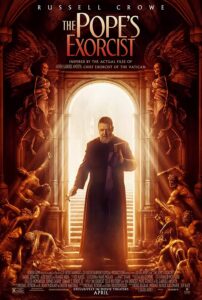
The Pope’s Exorcist
It is 1987 and Father Gabriele Amorth (Russell Crowe), Chief Exorcist of the Vatican, is called upon to do the job inscribed in his title – to free a young boy from demonic possession. But, as ninety-eight percent of the time, it is only a case of psychic problems: this is what he tries to explain before the Congregation for the Doctrine of the Faith, divided into the factions of Cardinal Sullivan, a member of the new ecclesiastical generation, and Cardinal Lumumba, representative of the old order. Mediating between the two positions is the Pope (Franco Nero) himself, who sends Amorth to Spain, where inside the abbey of San Sebastiano, according to the report of the presbyter Father Esquibel (Daniel Zovatto), a possession is in progress demonic. But the place hides much more, a secret that has its roots in a buried and forgotten past…
The real father Gabriele Amorth is taken up here through hints and clues, indeed the strengths of the character are built on real references.
The name encapsulates the thing – its true form, its true purpose. Everything. Be it an inanimate object, an element of nature or a living being. In Genesis it is written that the Lord brought all the animals before Adam to give him a name, and “however man called each of the living beings, that must be his name” – St. Augustine wonders why Adam didn’t give a name to the fish too…
Then there is Quinto Valerio Sorano, the tribune of the plebs who dared to reveal the secret name of Rome to the enemies, and was put to death for this – the Roman generals, under the walls of an enemy city they were besieging, kept the rite of “evocatio”, with which they lured the gods of that place out of the sacred enclosure to weaken its defences, but the formula was effective only by knowing the name of the deity to whom the city was consecrated.
The names of things, whether they are inanimate objects, elements of nature or living beings, are the obsession of all the protagonists of The Pope’s Exorcist. Because giving or knowing their name, the real and secret epithet, gives strength and control and dominion over all the animals of the earth as over the city of Rome. It is only a question of this, and both the men who walk in the sunlight and the acherontic demons know it well. Cardinal Sullivan and all the new breed of high prelates want to dismiss not so much Father Amorth as the title he boasts, “Chief Exorcist of the Vatican”, because the aim is not to extinguish a man but the idea of him; of the Pope in office, friend and protector of Amorth, we never know the name, or rather, none is ever pronounced, because he is a guardian, a vicar of the divine presence and we must protect him in all ways, esoteric or exoteric they are; Amorth himself, in the rites and invocations of the exorcist ritual, does nothing but invoke the power of words and names, advising Father Esquibel to pray in Latin and not in Spanish and ordering the demon who has taken possession of Henry to reveal his real name.








